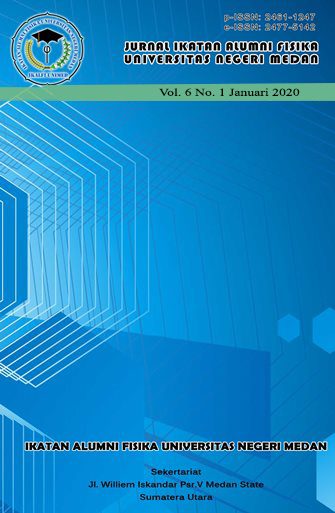Pengaruh Model Pembelajaran Inquiry Training Terhadap Keterampilan Proses Sains Siswa Pada Materi Pokok Usaha Dan Energi Di Kelas X Semester II SMA Swasta Cerdas Murni Medan T.P 2018/2019
DOI:
https://doi.org/10.24114/jiaf.v6i1.18398Keywords:
Model Inquiry Training, Keterampilan Proses Sains SiswaAbstract
Penelitian ini berjudul pengaruh model Pembelajaran Inquiry Training terhadap Keterampilan Proses Sains Siswa pada Materi Pokok Usaha Energi di Kelas X Semester II SMA Swasta Cerdas Murni Medan T.P 201/2019. Penelitian ini bertujuan untuk mengetahui keterampilan proses sains siswa dengan menggunakan model Inquiry Training dan konvensional, serta mengetahui mengetahui pengaruh model Inquiry Training terhadap keterampilan proses sains siswa. Penelitian ini menggunakan metode quasi experiment dengan desain penelitian Two Group Pretest-Postest design. Populasi dalam penelitian ini adalah seluruh siswa kelas X MIA SMA Swasta Cerdas Murni Medan yang memiliki nilai KKM Fisika sebesar 70. Sampel dalam penelitian ini terdiri dari dua kelas yaitu X MIA-1 sebagai kelas eksperimen dan X MIA-2 sebagai kelas kontrol yang diambil dengan teknik random sampling. Instrumen yang digunakan pada penelitian ini adalah tes KPS dalam bentuk essay dengan jumlah soal sebanyak 7 soal yang telah divalidasi oleh validator.Hasil pretes nilai rata-rata KPS kelas eksperimen dan kelas kontrol adalah 14,52 dan 16,67. Hasil postes nilai rata-rata KPS kelas eksperimen dan kelas control masing-masing 70,00 dan 66,19. Berdasarkan uji t menggunakan program SPSS 20 menunjukkan bahwa terdapat pengaruh yang signifikan antara model Inquiry Training terhadap keterampilan proses sains siswa. Berdasarkan hasil uji t menunjukkan terdapat peningkatan keterampilan proses sains siswa dengan menggunakan model Inquiry Training. ABSTRACTThis study entitled the influence of the Inquiry Training Learning Model on Science Process Skills of Students in the Main Material of Energy Business in Class X Semester II of Medan Pure Smart Private High School T.P 201/2019. This study aims to determine students 'science process skills using the Inquiry Training and conventional models, and find out to know the effect of the Inquiry Training model on students' science process skills.This study uses a quasi-experimental method with the research design of Two Group Pretest-Postest design. The population in this study were all students of class X MIA Medan Pure Pure Private High School who had a KKM Physics value of 70. The sample in this study consisted of two classes namely X MIA-1 as the experimental class and X MIA-2 as the control class taken with random sampling technique. The instrument used in this study is a KPS test in the form of an essay with a number of questions as many as 7 questions that have been validated by the validator.The results of the pretest scores of the experimental class KPS and the control class were 14.52 and 16.67. The post-test results of the average score of the experimental class KPS and control class were 70.00 and 66.19, respectively. Based on the t test using the SPSS 20 program, it shows that there is a significant influence between the Inquiry Training model of students' science process skills. Based on the results of the t test, there is an increase in students' science process skills using the Inquiry Training model.References
Arikunto. S,(2000), Manajemen Penelitian, Jakarta : RinekaCipta,
Baharuddin & Wahyuni, E. N., (2008), Teori Belajar dan Pembelajaran. Yogyakarta: Ar-ruzz media
Cahyo, N. Agus., (2013), Panduan Aplikasi Teori-Teori Belajar Mengajar,
Jogjakarta: DIVA Press
Dimyati&Mudjiono., (2006), BelajardanPembelajaran. Jakarta: RinekaCipta.
HamalikOemal., (2008), Kurikulum dan Pembelajaran. Jakarta :BumiAksara
Hosnan., (2014), Pendekatan Saintifik dan Kontekstual dalam Pembelajaran Abad 21. Bogor : Ghalia Indonesia
Joyce, B., Weil,M, dan Calhoun, E., (2009), Model Of Teaching, Model-Model PengajaranEdisiKedelapan. Yogyakarta: PustakaBelajar
Kadhijah., (2013), Belajar Dan Pembelajaran, Bandung: CitaPustaka Media
Kristin, Desi (2014), Pengaruh Model PembelajaranInquiry TrainingMenggunakan Media PowerpointTerhadapHasilBelajarSiswa, JurnalInpafi.Vol. 2, No. 2, Mei 2014
Kanginan,Marthen,(2003).Fisika 2000, Jakarta : Erlangga,
Littlejohn, Stephen W. dan Foss, Karen A., (2014), TeoriKomunikasi Theories of Human Communication.Edisi9.Jakarta :SalembaHumanika.
Nasution, S., (2008).BerbagaiPendekatandalam Proses BelajarMengajar.Bandung: BumiAksara
Paul, Suparno., (2013), Miskonseps idan Perubahan Konsep Pendidikan Fisika. Jakarta: Grasindo
Purwanto., (2009), EvaluasiHasilBelajar, Yogyakarta: PustakaPelajar
Rusman,(2011),Model-Model Pembelajaran, Jakarta : Rajawali Press,
Sanjaya,Wina., (2011), Strategi Pembelajaran Berorientasi Standar Proses Pendidikan, Jakarta: Kencana Prenada Media.
Sirait,Ratni (2012),Pengaruh Model Pembelajaran Inquiry Training Terhadap Hasil Belajar Siswa Pada Materi Pokok Usaha Dan Energi Kelas VIII Mts N-3 Medan, Jurnal Pendidikan Fisika, Vol. 1 No. 1. ISSN 2252-732X
Slameto., (2010). Belajar dan Faktor-Faktor yang Mempengaruhinya, Jakarta: Rineka Cipta.
Sudjana, N., (2009). PenilaianHasil Proses BelajarMengajar, Bandung: Rosda
Karya
Trianto.,(2007),Model-model Pembelajaran Inovatif Berorientasi Konstruktivistik, Jakarta: Prestasi Pustaka.
Trianto, (2009), Mendesain Model Pembelajaran Inovatif-Progresif:Konsep, Landasan dan implementasinya pada Kurikulum Tingkat Satuan Pendidikan. Jakarta :KencanaPerdana Media Group
Winataputra, Udin, dan Tita, Rosita, (1996), Belajar Dan Pembelajaran, Jakarta, Depdikbud
Downloads
Published
Issue
Section
License
Copyright (c) 2020 JURNAL IKATAN ALUMNI FISIKA UNIVERSITAS NEGERI MEDAN

This work is licensed under a Creative Commons Attribution 4.0 International License.
Authors who publish with this journal agree to the following terms:- Authors retain copyright and grant the journal right of first publication with the work simultaneously licensed under a Creative Commons Attribution License that allows others to share the work with an acknowledgement of the work's authorship and initial publication in this journal.
- Authors are able to enter into separate, additional contractual arrangements for the non-exclusive distribution of the journal's published version of the work (e.g., post it to an institutional repository or publish it in a book), with an acknowledgement of its initial publication in this journal.
- Authors are permitted and encouraged to post their work online (e.g., in institutional repositories or on their website) prior to and during the submission process, as it can lead to productive exchanges, as well as earlier and greater citation of published work (See The Effect of Open Access).

